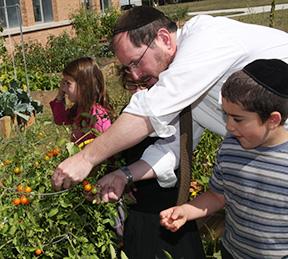Rabbi Michel Twerski, a founder and the spiritual leader of Yeshiva Elementary School, a yeshiva preparatory school serving K4 through eighth grade, said the number 25 is significant.
“The blessings of the Kohanim [priests] begin with the words, ‘So shall you bless,’” which begins with the Hebrew letters kuf and hay, having a numerical value of 25, he said.
That fact “suggests that when we reach a milestone of the magnitude of 25, that we are obliged to celebrate that achievement with a communal expression of our gratitude to the Source of all blessing,” he said.
Therefore, this year the school is celebrating its 25th year in existence. It will mark this occasion with a banquet on Sunday, Jan. 12.
YES convened its first classes in 1989 with 64 students. Today, in its 25th academic year, it has about 190 students.
Moreover, after starting in the old building formerly occupied by Congregation Anshe Sfard, YES remodeled and expanded that facility into a modern building that was dedicated in 2001.
Dana Margolis, a parent of children at YES and a member the board of directors, attributes the school’s success to the individual attention it can provide each student.
“The school is flexible. It’s willing to meet the needs of all the kids, and in that way the school operates very much like a family,” Margolis said. “You feel like you’re sending your kids to a place that is an extension of their home.”
In fact, “The mission of the school is really to help the individual child to be able to reach their maximum potential,” said Rabbi Dovid Kossowsky, principal of YES. “Different students have different strengths and we need to identify them and emphasize them.”
Kossowsky also spoke of the constant drive “to empower the children to be independent learners. It is really that ability to learn on their own that will give our students the confidence and the abilities to succeed in whatever direction their lives lead them.”
Moreover, said Kossowsky, the school is now doing innovative work in “creating evaluations to monitor the students’ progress” in its Judaic curriculum. “There are many schools now that are working on this area, but there is no standardized testing, to my knowledge, to date in specifically the realm of Judaic studies [anywhere].
“Therefore we are trying to pioneer this project and create a form of standardized testing that will give us the knowledge and the ability to make every student succeed.”
Alan Borsuk served as board president for the first six years of the school’s existence. He has children who graduated from YES and has grandchildren currently attending the school.
“The kids are ready to go on to a yeshiva and do great work on those levels and go on to the most demanding and rigorous schools,” said Borsuk. “Close to 100 percent of our students go on to yeshivas or comparable institutions.”
“That said,” Borsuk continued, “we wanted them also to have a strong and useful general studies program. From the very start, we always hired licensed teachers. We always were aiming to have a vibrant and meaningful general studies program as well as a religious studies program.”
YES also strives to foster character development. For example, students have shared experiences with residents of The Jewish Home and Care Center and are involved in the Chessed (Kindness) Program. The program gives YES students the responsibility of helping in the community, whether that’s other kids with homework or adults with house chores.
“They are caring kids,” said Rabbi Yosef Schlussel, current president of the board of directors. “They clearly have received this from the school.”
YES has faced its share of challenges, beginning with its creation.
“When we created the school it was a controversial decision,” said Borsuk. “There were people who didn’t want us to do it, [who said] that we should stay with the existing institutions rather than start our own school.”
Borsuk and Twerski add that there were no available funds nor did any of the founders have experience in creating or running a school.
“The fact that we proceeded when we did was a huge leap of faith,” said Twerski. “Some people would call it reckless, but our sense was that we had to do right by our children and that we would do what we had to do and G-d would support us. We … acted in faith and it was vindicated.”
Among the school’s current challenges is what some of its officials have termed its invisibility to the general community, partly due to its location on Milwaukee’s west side.
Said Rabbi Aaron Gross, the school’s director of development: “The whole greater Milwaukee community does not find itself in our neighborhood very often, so an appreciation of seeing what our school is in the overall community is not readily appreciated.”
Schlussel agreed. “I think some people have perceptions or misperceptions of who we are and have a notion that they might not fit or feel welcome,” he said. “The school’s population might be larger if we had a greater visibility in the community.”
Gross also mentioned a need to expand the facilities. Currently, the gymnasium doubles as a lunchroom, and the beis medrash (study hall) doubles as the library. The school’s leaders would like to have separate spaces for these functions, Gross said.
The banquet will be held at the Four Points by Sheraton Milwaukee North, 8900 N. Kildeer Ct. in Brown Deer. The reception will start at 5:15 p.m., the program at 6:15 p.m.
Featured speaker will be Rabbi Moshe Tuvia Lieff, spiritual leader of Agudath Israel Bais Binyomin in New York City.
For more information, contact the school, 414-871-9376.
Joshua Becker is a Spanish teacher for Shorewood Public Schools and a freelance writer.


